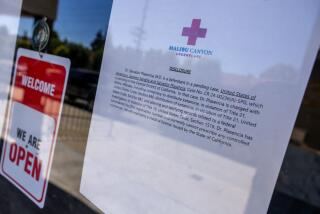They Call Him ‘Dr. Death’ : Paramedic Faces Charge of Refusing to Treat Dying Man
- Share via
The doctors and nurses who supervised Robert Dougherty, a Los Angeles Fire Department paramedic for nearly 20 years, said he took on too much, frequently prescribing treatment in the field without seeking the advice of physicians.
His ambulance partners said he had a habit of leaving sick and injured patients to their own resources. His co-workers simply nicknamed him “Dr. Death.”
But Dougherty, now facing criminal charges of refusing to treat a dying alcoholic, was well-connected within the Fire Department. He served as the best man at the chief paramedic’s wedding. He emceed the paramedic chief’s retirement party.
‘I Was Intimidated’
“I was intimidated by him,” Dougherty’s partner, James Mihalka, testified Wednesday during Dougherty’s preliminary hearing on two felony charges of falsifying public documents and misdemeanor counts of negligence and incompetence. “You don’t talk to Mr. Dougherty; you work for Mr. Dougherty. He is in charge 100%. . . . My job was to carry the box and keep quiet.”
Testimony on Wednesday revealed that Dougherty, 49, had been counseled repeatedly by physicians and nurses who were concerned about situations when he either failed to follow procedures or refused to treat patients. In one case, he dismissed a patient with a gunshot wound to the head as a “mute” who had “an abrasion.”
Mihalka testified that he had filed official reports about Dougherty’s refusal to treat patients on at least two occasions, but they were never acted on.
When he wrote his own detailed account of the Sept. 23, 1985, incidents that preceded the death of Melvin Wagner, 42, a partially paralyzed alcoholic who had pleaded to be taken to a hospital, Mihalka said department officials dismissed the report as “too elaborate” and ordered him to write a much briefer--and less inflammatory--account.
“This man Mr. Dougherty has been told repeatedly that he is not to continue this type of behavior,” said Deputy Dist. Atty. Brian Kelberg, “. . . and yet he continually places the life of people in jeopardy by making himself judge, jury and executioner.”
According to Kelberg, Dougherty said he had not asked Wagner to sign a form refusing treatment at the scene, because “I didn’t want to let that scum bag use my pen.”
“It is true this man lived in what you might call a flea bag hotel,” Kelberg said. “He was a chronic alcoholic. He was also dying at the time.”
An autopsy found that Wagner probably died of problems stemming from cirrhosis of the liver.
Dougherty’s attorney, Elfriede Shook, has refused comment on the allegations, as has Dougherty.
“I don’t want to reveal my hand,” Shook said Tuesday in an interview outside the courtroom. “Of course, I do not believe he is guilty of the charges.”
Al Cowan, who recently took over as head of the department’s emergency medical services bureau, said he had been unaware of the several years of apparent complaints about Dougherty’s conduct.
“I’m not sure that a lot of people knew what was going on,” he said in an interview. “I know if the administration had known what was going on, clearly there would have been a stop put to it.”
Yet more than a dozen paramedics and law enforcement investigators have told The Times that Dougherty’s reputation was legendary within the department. But internal complaints never got anywhere--supposedly, they said, because of Dougherty’s friendship with former chief paramedic Doug Brown.
Criticism by Rivers
The issue came to a head, many said, when the department was criticized in the national media by comedian Joan Rivers, who complained that a paramedic had refused to allow her to accompany her husband in the ambulance after he suffered a heart attack.
“She’ll ride in the ambulance over my dead body,” she quoted the paramedic as saying, during an interview with People Magazine. The offending medic, according to investigators, was Dougherty.
“You could just see it coming. You could just see a bad apple was going to turn sour,” said a leading Los Angeles emergency physician who worked regularly with Dougherty. “The nurses would joke about it on the radio: ‘Oh, yeah, Dr. Death is at my base (hospital).”
Mihalka, whose testimony Wednesday was supported by nearly half a dozen other witnesses, said he and Dougherty got the initial call from a San Pedro hotel at 8:32 a.m. Wagner told them he “didn’t feel well” and wanted to be taken to the hospital. Dougherty, without taking any of the man’s vital signs, determined that the case was “a transportation problem” and left, Mihalka said. Department dispatch records show the paramedic team was at the hotel for only three minutes.
The team was called back at 1:19 p.m. by Wagner’s social worker, Mary Lou Donohue, who testified that the man was gasping for breath and rolling his eyes when she arrived.
“Dougherty said if you’re that concerned about him, put him in the back seat of your car and take him to the hospital yourself,” Mihalka testified. When he tried to intervene, Mihalka said, Dougherty--a higher-ranking paramedic and by department policy the supervisor--held up his hand to keep him quiet, he said. The team left the hotel within six minutes without having looked at Wagner, he said.
Donohue called again at 2:50 p.m. “I told them he had now stopped breathing,” she testified, “and I was wondering if they considered that life-threatening enough.”
By the time the paramedic ambulance pulled up to the hotel for the third time, Mihalka said, a fire captain who had arrived earlier was standing on the curb, running the edge of his hand across his neck to signify that Wagner was dead.
Dougherty was removed from paramedic service after the incident and now lives in Guerneville, Calif.
More to Read
Sign up for Essential California
The most important California stories and recommendations in your inbox every morning.
You may occasionally receive promotional content from the Los Angeles Times.













